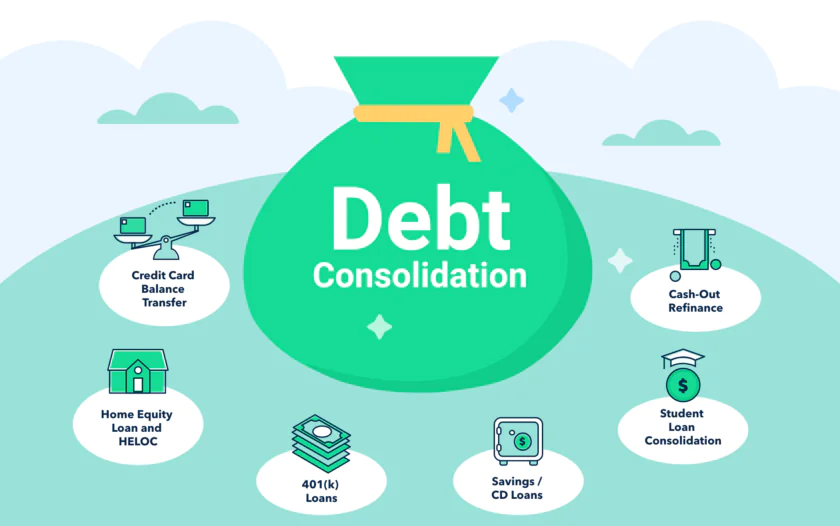Concept of Debt Consolidation?
Debt consolidation serves as a strategic tool to streamline your financial management. Essentially, it involves merging multiple debts—such as credit card balances, personal loans, and medical bills—into a single, more manageable loan. This consolidated debt typically carries a fixed interest rate and entails a single monthly payment, simplifying your financial obligations.
The process of debt consolidation typically unfolds in a straightforward manner. Initially, compile a comprehensive list of all your outstanding debts, encompassing credit card balances, personal loans, medical loans, student loans, auto loans, and any other financial liabilities you may have.
Subsequently, embark on researching lenders offering debt consolidation loans. Assess various factors including interest rates, repayment term lengths, and associated fees to pinpoint the most suitable option for your financial circumstances. Once you’ve identified a favorable lender, proceed to submit an application for a debt consolidation loan. Upon approval, you’ll receive funds from the new loan to settle all your other outstanding debts.

Understanding the Differences Between Debt Consolidation and Debt Settlement
Often, debt consolidation and debt settlement are conflated, but they are distinct financial strategies for managing and improving your debt situation. Let’s delve into the specifics of each approach to better grasp their respective impacts on your financial standing.
Debt Consolidation: Streamlining Your Debt Repayment
Debt consolidation entails merging multiple existing loans into a new consolidation loan, resulting in a single monthly interest payment. With this approach, you receive a lump sum from your new lender, which you can utilize to promptly settle your remaining debts, leaving you with a singular loan amount to repay.
It’s crucial to note that debt consolidation doesn’t erase your debt entirely. Rather, it consolidates all your debts into one manageable loan, typically offering a fixed, and often lower, interest rate.
Click here to check out Credit Calculators.
Debt Settlement: Negotiating to Reduce Debt Burden
On the other hand, debt settlement involves engaging in negotiations with creditors to settle your debts for an amount less than what you owe. This process entails proposing to your creditor(s) to accept a reduced payment to satisfy the debt.
Should an agreement be reached between you and your creditor(s), you would then proceed to pay the settled amount either in a lump sum or through a series of installments. Typically, engaging a debt settlement attorney is advisable for navigating this process, albeit it may entail additional costs depending on the extent of your debt burden.
Choosing the Right Path: Debt Reduction vs. Creditor Management
While both strategies aim to alleviate your debt burden, they serve different purposes. Debt settlement ultimately aims to reduce the total debt owed, while debt consolidation focuses on streamlining repayment by consolidating multiple creditors into a single manageable loan.
If you find yourself struggling to meet payments and are unable to repay the full amount owed, debt settlement might offer a viable solution. Conversely, if you can manage your debts but seek a more organized repayment approach, debt consolidation may prove to be the more suitable option.
Understanding the nuances between debt consolidation and debt settlement empowers individuals to make informed decisions tailored to their specific financial circumstances and goals.
Exploring the Pros and Cons of Debt Consolidation
Debt consolidation serves as a financial strategy that warrants careful consideration, as its advantages and disadvantages can significantly impact your financial well-being based on your circumstances.
Pros
- Simplified Financial Management: By consolidating multiple debts into a single monthly payment, debt consolidation streamlines financial management, making it easier to keep track of payments and deadlines.
- Potentially Lower Interest Rates: Debt consolidation often offers the opportunity to secure lower interest rates compared to those of credit cards or other high-interest debts, which can lead to significant savings over time.
- Credit Score Improvement: Consistently making timely payments on a consolidated debt can positively impact your credit score, demonstrating responsible financial behavior and reducing overall debt burden.
- Enhanced Loan Terms: With an improved credit score and reduced debt load, you may qualify for better loan terms, enabling you to potentially pay off your debt more efficiently and at a lower cost.
Cons
- Risk of Accumulating More Debt: Consolidating debt can create a false sense of financial freedom, leading some individuals to accrue additional debt instead of addressing underlying spending habits.
- Potential Fees and Costs: There may be associated fees and costs with debt consolidation, such as balance transfer fees or origination fees, which could offset potential savings from lower interest rates.
- Risk for Secured Debts: Debt consolidation poses a risk for secured debts like mortgages, as it could jeopardize collateral and lead to adverse consequences if payments are not made as agreed.
- Temporary Credit Score Impact: Closing existing accounts as part of the consolidation process may temporarily impact your credit score, as it reduces the average age of your accounts and affects credit utilization ratios.
When considering debt consolidation, it’s crucial to weigh these pros and cons against your financial goals and circumstances to determine whether it aligns with your overall financial strategy. Consulting with a financial advisor can provide valuable insights and guidance tailored to your specific needs.
When Debt Consolidation Makes Financial Sense
For many individuals, securing a debt consolidation loan can serve as a much-needed financial lifeline when it feels like drowning in debt. If you find yourself struggling to make headway on various loans or credit cards, consolidating your debts might offer a strategic solution to ease the burden and pave the way toward financial freedom.
Scenario #1: Credit Card Chaos
Picture this: you’re juggling three credit cards, each laden with balances—$5,000, $7,000, and $10,000—accompanied by an average interest rate of 20%. Despite dutifully making minimum payments, it feels like you’re stuck in a financial quagmire, with interest devouring a significant chunk of your monthly budget. At such rates, you could end up shelling out as much as $364.54 in interest annually. However, by consolidating these credit card debts into a new loan boasting a more favorable interest rate of 10%, you stand to save substantially on interest payments while steadily marching towards debt-free horizons.
Scenario #2: Multiple Loan Madness
Perhaps you’re grappling with the complexities of managing several loans—be it a personal loan, a car loan, or a student loan—each flaunting its unique terms and interest rates. The hassle of keeping tabs on multiple payments is wearing you thin, and the fear of missing payments looms large. Consolidating these loans into a single entity not only simplifies your financial landscape but also bestows upon you the comfort of a solitary, predictable monthly payment, thereby trimming down your overall interest costs.
Scenario #3: Overwhelming Debt Burden
In some instances, the sheer weight of accumulated debt becomes too burdensome to bear. The constant struggle to keep pace with minimum payments takes a toll on your peace of mind and financial stability. Enter debt consolidation: a beacon of hope in tumultuous seas. By bundling your debts, you can elongate the repayment period and slash your monthly payments, providing immediate respite and affording you the breathing space necessary to regain control of your financial destiny.
Debt consolidation stands as a potent financial strategy when wielded judiciously. Whether you’re ensnared in the clutches of high-interest credit card debt, juggling multiple loans, or buckling under the weight of overwhelming financial obligations, contemplating debt consolidation could be the pivotal step towards streamlining your finances and charting a course towards a debt-free future.

When Debt Consolidation Might Not Be the Best Choice
While debt consolidation can offer relief from managing multiple debts, it’s not always the optimal solution for everyone. Understanding when it might not be the right choice can save you from potential financial pitfalls.
If you’re concerned about maintaining healthy credit utilization or the risk of accumulating new debt post-consolidation, it’s crucial to address the underlying financial habits first. Failing to do so could lead to a worsening financial situation.
Here are scenarios where opting for a low-interest personal loan could be a wiser decision than debt consolidation:
Scenario 1: Poor Credit History
If your credit score isn’t favorable and you don’t qualify for favorable consolidation loan terms, forcing a consolidation may not result in cost savings. Instead, focus on making consistent payments to improve your financial standing.
Scenario 2: Fear of Accumulating New Debt
Recognizing a tendency to accumulate more debt post-consolidation is crucial. In such cases, opting for a personal loan might not be prudent as it could create more credit card debt.
While debt consolidation is beneficial for many, assessing your financial situation is vital before making a decision. If concerns about accruing more debt, facing high interest rates, or not qualifying for favorable consolidation loans arise, opting for a low-interest personal loan may be a better fit.
Choosing the Right Debt Consolidation Lender: What to Look For
When contemplating debt consolidation, it’s vital to grasp what attributes to seek in a potential lender and the various factors comprising a debt consolidation loan.
Interest rates, fees, and terms differ among lenders, significantly impacting the total cost of your consolidation loan. It’s advisable to shop around and gather quotes from multiple issuers to find the most competitive rates and terms.
The annual percentage rate (APR) offers a comprehensive insight into a loan’s cost, encompassing both interest rates and fees. Comparing APRs among lenders enables an apples-to-apples comparison of the overall cost of each loan.
Assess your financial situation and ascertain whether the lender provides repayment flexibility aligning with your needs. Look for features like adjustable repayment schedules or the ability to make extra debt payments without penalties.
A lender’s customer support is pivotal, particularly if issues arise or questions emerge during the loan process. Peruse reviews and evaluate the responsiveness and helpfulness of the issuer’s customer service team.
To facilitate an informed decision when selecting a debt consolidation lender, adhere to this checklist:
- Compare interest rates.
- Examine fees.
- Evaluate loan repayment terms.
- Check the APR.
- Assess customer service support.
Our top recommendation for debt consolidation loans is LightStream. LightStream offers a variety of personal loan options, including those tailored for debt consolidation.
Here’s why LightStream stands out:
- Competitive APRs: It provides competitive interest rates to help you save money on your debt consolidation loan.
- Flexible terms: LightStream offers flexible loan repayment terms, allowing you to select the optimal repayment period for your financial situation.
- No fees: It does not impose origination fees, prepayment penalties, or other hidden fees, ensuring transparency in your loan terms.
- Excellent customer support: With a reputation for outstanding customer service, LightStream can guide you throughout the loan process.
Taking into account elements such as interest rates, fees, terms, repayment options, and customer service, you can strategically choose a lender that best fits your financial objectives. It’s crucial to recognize that selecting the right lender can greatly impact your debt consolidation journey. Therefore, investing time in thorough research and thoughtful consideration is essential to make an informed decision.
Navigating Debt Consolidation
Debt consolidation stands as a potent financial tool for individuals aiming to streamline their financial commitments. By simplifying the repayment process and securing lower interest rates, considerable time and money can be saved.
However, while there exist myriad benefits to debt consolidation loans, their efficacy hinges on responsible usage. Without maintaining financial discipline, there’s a risk of accruing further debt post-clearance. It’s imperative to remain cognizant of the varying fees and costs associated with consolidation lenders, as these factors could potentially nullify the benefits of consolidation.
A comprehensive assessment of one’s financial situation is crucial — analyzing the types of debt held, personal financial discipline, and interest rates tied to obligations. Seeking professional guidance from a financial advisor or credit counselor is advisable, as they can offer tailored expertise pertinent to individual financial circumstances.
Through informed decision-making and adherence to financial discipline, the journey towards long-term financial well-being and a debt-free future begins. Understanding available options and selecting the most suitable one in alignment with financial goals and capabilities is paramount.
Source: https://www.marketwatch.com/guides/personal-loans/is-consolidating-debt-a-good-idea/
To read more articles, visit credit calculators.







